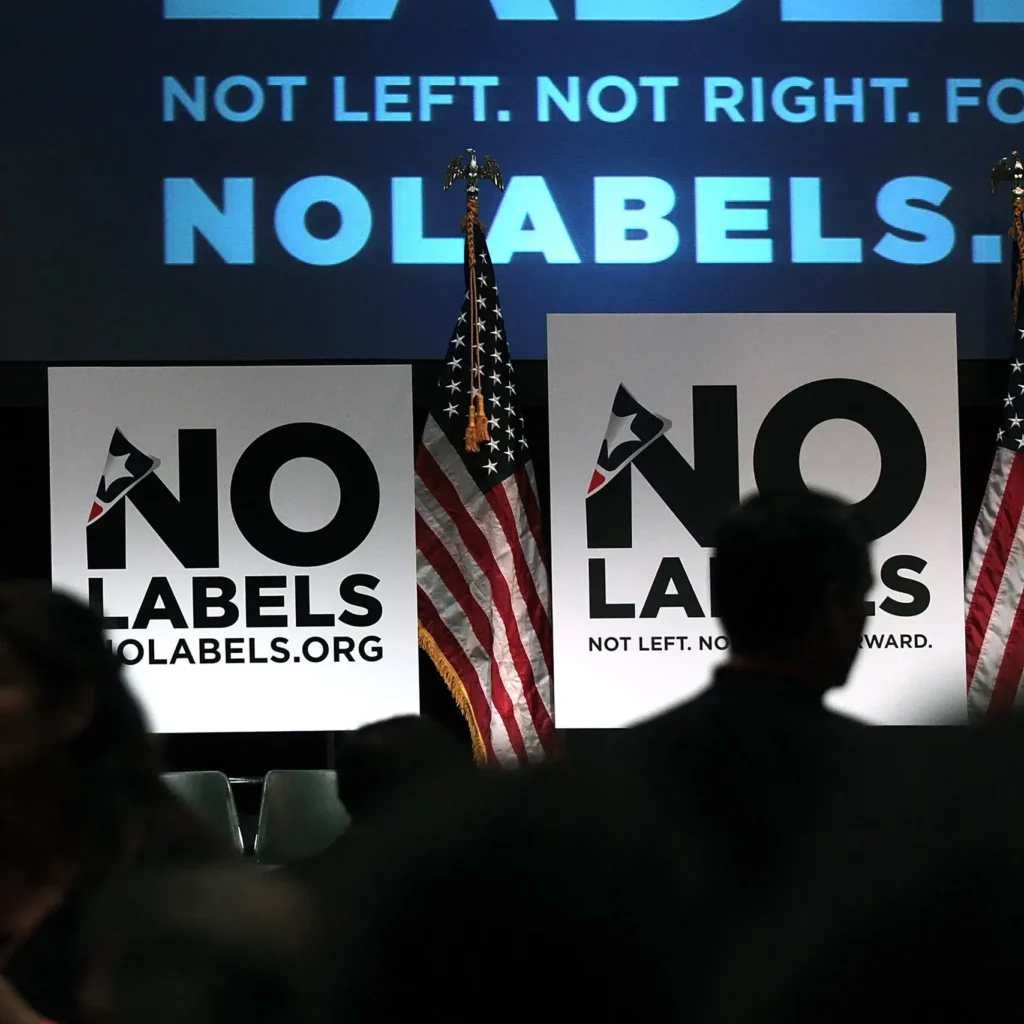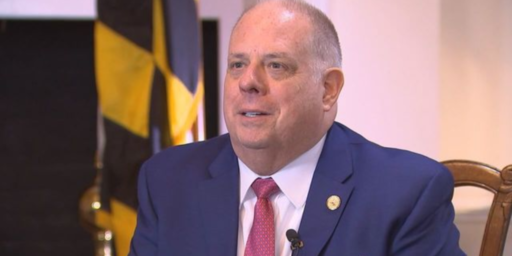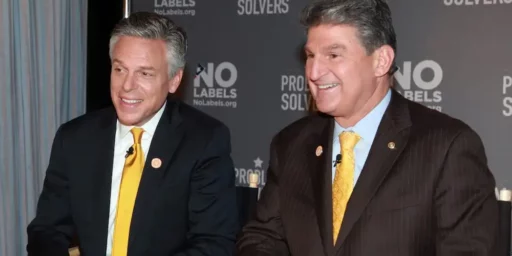No Labels a No Go
They're fast running out of time to find a candidate.

POLITICO (“No Labels is running out of time — and candidates — to make its case“):
Donors to No Labels are starting to fear that the third-party group missed its window for launching a much-hyped presidential bid and are questioning whether to make future financial commitments to the organization.
Those fears have intensified after two high-profile No Labels candidate targets — former Maryland Gov. Larry Hogan, a Republican, and West Virginia Sen. Joe Manchin, a Democrat — passed on the chance to run for president, and as the party’s planned April presidential nominating convention approaches without a clear ticket in place.
“No Labels just missed one heck of an opportunity to potentially be viable, and now I don’t know that they can be viable,” said Jim Teague, the CEO of a Texas oil and gas company and a No Labels donor. “I don’t know who they can possibly get to run that would generate excitement that Joe Manchin would have generated,” he said, adding that it’s “pretty doubtful” he will donate to the organization in the future.
Regardless of how much enthusiasm a 77-year-old (at the time of the election) Joe Manchin would have inspired, there was simply no way No Labels could have been “viable” under our electoral rules. The reason Manchin and Hogan couldn’t be persuaded to run was because they realized not only that but that they would most likely serve as “spoiler” candidates who would have enhanced Donald Trump’s prospects for re-election.
No Labels officials say they are continuing to move forward with plans to launch a presidential run and are looking at “sometime after Super Tuesday to determine if we offer our line and who would be on it,” spokesperson Maryanne Martini said.
Considering that Super Tuesday is tomorrow and they’re not close to being ready to go, one would expect any announcement to come afterward, yes.
The sense that there is a lack of clarity around the group’s 2024 plans — including the absence of a slate of candidates — has caused anxiety among at least the half dozen donors who spoke with POLITICO.
The group last held a meeting with supporters on February 23. But, according to Martini, they focused on a successful lawsuit against hostile domain squatting on NoLabels.com — not the presidential race or updates on the candidate selection process.
No Labels is choosing candidates with “a very secret process,” said Bill Kunkler, who has been a donor and supporter of the group since 2018. He said possible names are being vetted by a small group of leaders and advisers.
“There’s going to be a proper vetting process so that we don’t end up with somebody where there are surprises,” said Kunkler, who was a key fundraiser for Republicans Mitt Romney and Paul Ryan when they ran for president and vice president in 2012. “People might call this a ‘smoke-filled room’ process, but my response is, they can either vote for us and our candidate in November or not. What’s smoke-filled about that?”
I don’t know that any of the non-major parties hold primaries. That hasn’t stopped the Libertarians or Greens from getting on ballots or garnering votes, so wouldn’t expect it to hurt No Labels if they picked a high profile candidate. But, again, the system is really stacked against them.
Manchin himself recently echoed a common criticism about the group from Democrats, and said it needed to take a “hard look” at a possible presidential unity ticket. Such a run would “basically work as a spoiler,” he said, particularly if it can only get on the ballot in a handful of battleground states.
Murry Bowden, a Texas businessperson who has been a longtime donor of No Labels, said he was “disappointed” that Manchin didn’t run and called the senator’s decision alongside Hogan’s “a setback” for the group.
“Those types of people would have been good for them to be on the ticket, and if they had gotten both of them, it would have been great,” he said. “They’re out, so I’m not sure who’s up next, if anyone.”
This comes as the general election is clearly shaping up to be a choice between former President Donald Trump and President Joe Biden — two candidates backers of No Labels have said they won’t support.
In an ideal world, it’s possible that I would prefer Hogan to Biden. And I’d certainly prefer either of them to Trump. But it’s been generations since a minor party candidate—Alabama Governor George Wallace in 1968—won* even a single Electoral Vote.
This cycle would seem especially ripe for an alternate. As has been noted endlessly, both Biden and Trump are underwater in the polls, with more Americans viewing them unfavorably than favorably. But there’s no galvanizing issue—like Civil Rights was during Wallace’s run—that would break the strong habit of most American voters to stick with their preferred party.
For the most part, this is true of potential candidates as well:
The group continues to keep the door open for Nikki Haley to be its candidate despite the former U.N. ambassador having pledged to remain in the GOP primary through Super Tuesday.
But Haley joining a No Labels ticket could be a long shot.
“All the talk about the independent, No Labels, all that — I haven’t talked to anybody about that. I know that they have sent smoke signals that they want me to talk to them, but I’m a Republican,” she said at a gathering with reporters in Washington, D.C., on Friday. “I’m trying to really talk about a way forward for Republicans.”
While there are quite possibly a significant number of people who would prefer Haley to Trump or Biden, the number who would vote for her knowing she can’t win is much smaller. And she would have a hell of a time ever running as a Republican again.
And regardless of how Haley personally feels about No Labels, joining the ticket could potentially subject her to “sore loser” laws that prohibit her from being on the ballot in certain states under another party line.
“I’d be pissed if I was a donor,” said the person who has direct knowledge of No Labels’ vetting process, noting that the ticket, if it comes together, will likely include lesser names at the top of it. “It’s like buying a ticket to see Taylor Swift, and you show up to see Madonna fall off the stage.”
It would be an interesting plot twist, though.
Most of the report focuses on No Labels’ ineptitude in organizing. But, really, that misses the point.
_________________
*There have been a handful of “faithless Electors” since who’ve written in another candidate as a protest vote.




Has Howard Schultz’s back healed yet?
The excitement generated by a Joe Manchin campaign?? If not for Ted Cruz, Manchin would easily be the most despised guy in DC, and the fact that the No Labels brass even considered Manchin as a viable candidate shows how out of touch the group is. Had its donors piled their cash and set fire to it, they would have at least gotten a little bit of heat and light in return.
No Labels serves three primary functions:
1) Some donors see it as a way to split votes away from Biden, allowing a Trump win
2) Some donors cannot let go of the eternal fantasy of third party for the centrists with policy positions that sit in the middle and so appeal to all. No Labels perfectly proved the sham of this by making it explicit they would not put forth any policy positions, remaining completely silent on abortion, the Israeli/Palestinian war and everything else
3) (And this is the big one) No Labels serves as a vehicle for the professional political campaigners who haven’t been able to land either a Dem or Repub job to suck down cash
Steven feels that having more choices in the general election is a good thing in and of itself, but No Labels shows that a simple “more” is not enough. No Labels literally stands for nothing but some vague idea of centrism, and have explicitly stated that they will not have official positions on the most controversial issues since they will be working towards “bipartisan solutions”. They are one with the Brooks school of punditry, i.e. someone who thinks the point of the biblical story of the Judgement of Solomon is that the best solution is always cutting the baby in half.
A real third party, a real choice would start at the local level and rally around issues there, and then gradually work their way up. But those that have tried that route, such as the Greens, have been sucked in by the lure of Presidential campaigns a generation before they were ready and beclowned themselves.
@MarkedMan:
Putting aside for the moment any ulterior motives these groups may have, on the surface the Greens occupy the opposite extreme from No Labels. They have a clear ideological program with specific policy positions on a range of issues. But because they never win elections beyond a few very local races, they can be as pure and ideologically rigid as they want. That’s one of the advantages of not having to govern. A truly functional political party commands a broader coalition.
The Libertarians are a little of both. Their platform is very specific (and way outside anything that can be remotely described as mainstream), but they’ve shown a willingness to nominate former elected Republicans who don’t subscribe to all the party’s official positions. That said, at the end of the day their lack of electoral success contributes to their being fundamentally unserious in their governing vision, just like the Greens.
(You might ask, isn’t that also true of the GOP? And my answer would be, well, kind of–but at least in theory they have some concrete policy goals that stand a reasonable chance of passing when they get into power. I can’t say that about the Libertarians or Greens for policies that differ from those of the two major parties.)
@MarkedMan:
Steven’s view is that a system that incentivizes more parties who can compete for and win seats in legislative elections would improve the quality of governing and representation. His position is more complicated and nuanced than just saying “more.”
Further, he would note that just having an additional candidate in the presidential process is not the same, not by a long shot, as actually having more parties in a systemic sense.
Steven has also been on the record as skeptical of No Labels for quite some time (and not just in the context of the 2024 cycle).
😉
@Steven L. Taylor: Dear Third Person Steven 😉 Rereading my post I can see where it came across as snark, but I didn’t intend it as such. I should have added, “As I’m sure Steven would agree, though, simply having more choices… and No Labels demonstrates that.”
Once again, this poses the question: Is there any con too obvious for a bunch of billionaires to fall for as long as it involves telling them that they are really the only ones who can save us all?
@Kylopod: I agree with what you said, but would like to flesh out my comment about the Greens. The party started out as one focused on ecology and as such had a lot of very active local chapters. But it has since transformed into a “all the liberal causes” party. It had some successes when it focused on those ecological issues, especially at the local level, but has had zero effect since. Today it serves several interests: a refuge for people who are too pure to ever vote for the least bad option, naïfs who are under the impression that if only enough people hear of all these wonderful liberal policies in their purest form a thundering herd will emerge to support them, and inevitably, grifters eager to siphon donors funds into their own pockets.
I think groups like the Audubon Society and the Nature Conservancy have had significantly more ecological impact than the Greens ever did and that can be explained to a large extent by the fact that they focus on their issues and don’t explicitly associate themselves with a party.
Absent substantial structural and electoral reforms, IMO the only way a third party wins a presidential election, and substantial representation in Congress, is if it splits from one of the duopoly parties.
@Kathy: One key counterfactual about Perot’s 1992 run is what would have happened if he’d stayed in the race the entire time. His dropping out and later reentering damaged his campaign. I think he’d still have lost. But he remains, to my knowledge, the only third-party presidential candidate ever to lead a poll at any point in the race. (He was ahead of both Clinton and Bush early on according to several polls.) And it leads me to believe there could be some lightning-in-a-bottle scenario where a third-party candidate does in fact win the presidency.
@Kylopod:
Well, there was Lincoln, but that was 160+ years ago. So maybe we are due?
@MarkedMan: Sometimes Steven lapses into third person, likely as a result of lack of caffeine.
The 😉 hopefully indicated some level of whimsy.
@Kylopod:
@MarkedMan:
Lincoln ran on the Republican ticket.
But a closer look at that election is interesting. Four candidates got electoral votes.
The past is a foreign country.
As to Perot, maybe he’d have won a state or two, maybe not even that. Looking back, he strikes me as a smarter, less cruel, less narcissistic version of Lardass A. Drumpf.
But, yes, it’s possible a third party candidate could win a general election. It’s just not even in the same galaxy as likely. It depends on various circumstances, too. Perhaps two vastly unpopular candidates in the duopoly, mixed with bad times and a charismatic third party candidate.
@Kathy: I guess I would ask: To what purpose? What is the use of a third party if they don’t represent a difference in policy? What are these policy differences that would be worth the effort of creating a new policy rather than just trying to effect change in the Democratic or Republican party? I’m not arguing against you, I’m sincerely asking.
It seems to me that the purposes parties serve are two fold: Large parties provide a peaceful mechanism for people who want power to obtain it, and small parties (at least effective ones) promote single issues, usually issues that do not have majority approval. But small parties could also be replaced by special interest groups as we have here in the United States.
@MarkedMan:
I tend to discount it, and not just because it required a Civil War. The Whigs had only existed for about 30 years, and that was following a roughly 30-year run for the Federalists. The fact is that the two-party system as we understand it today took some time before it became truly entrenched in an institutional sense. While I don’t think it’s totally impossible that a third-party candidate could win today, I don’t think the kind of situation where one of the major parties simply collapses, leaving a void to be filled, is how it would take place.
@Kathy:
…which had only been created a few years before (1854) as an anti-slavery party. That’s why I referred to Lincoln as an example of a third party capturing the Presidency.
@Kylopod: I agree. Shortly after the Civil War we had the same two parties we have today and no third party has been able to come to power. However, the nature of those two parties has changed continuously, as has the policies they promote. In the US, we don’t create new parties, but we do change the existing ones.
I would contend that the important division in American politics is not between the Democrats and Republicans but between the Deep South style of governance (Promoted from 1865 to roughly 1960 by the Democrats, but since then by the Republicans) and a more forward looking and democratic form of governance which is now exclusively associated with the Democrats but, at least early in my adult life, was not solely associated with either party.
I keep reading this as “No Labels a Go-Go.”
@MarkedMan:
I think you’re onto something. While Steven is not wrong in bringing up all the institutional features of our system that have made it very hard for third parties to gain a foothold, I think part of the reason for why the rigid duopoly developed in the first place was the Northern vs. Southern divide following the Civil War. The South’s total takeover of the Democratic Party to enforce Jim Crow contributed to a binary power struggle between the South and the rest of the country. If you look at the presidential elections between the end of Reconstruction and the mid-20th century, the Republicans won most of the time because the Dems had full control of the South but struggled everywhere else, where they were stigmatized due to memories of the Civil War. The few Dems who won–Grover Cleveland, Woodrow Wilson, and FDR–hailed from Northern states and were able to extend the Dems’ reach beyond the South. (And Wilson, anyway, only won because of a temporary split in the GOP between Taft and TR.) After the civil rights movement of the mid-20th century when the South started shifting toward the GOP, for the next several decades the Dems had their greatest success with Southern Dems like Carter and Clinton. It was only after the century rolled around that the regional party swap was complete–Dems dominating the Northeast, Repubs the South.
And yes, I definitely think to a large degree it was the parties, not the regions, that changed. The South didn’t change from liberal to conservative. It was conservative continuously, it’s just that so was the Democratic Party (or at least the party included conservatives as part of its coalition). Similarly, New England didn’t change from conservative to liberal; it was liberal to begin with, and used to be part of the Republican coalition until the party’s rightward shift since the 1980s.
@wr:
Ok, here’s my idea for 2028 — No Labels runs a No Candidate in both the Democratic and Republican primaries. No Candidate is just a slot to amass delegates, in the hopes of forcing a brokered convention from one or both parties, wherein an acceptable moderate from that party will be nominated as a consensus choice.
Ideally, America will get to choose between TWO centrist candidates.
On the off chance that No Labels controls a majority of the delegates for either party, then the decision of a candidate will be delayed until the electoral college meets. Do you want Donald Trump Jr, or whatever is behind door number 1?
The great hope is that No Labels controls a majority of delegates in both parties, and that America will vote for Whatever Is Behind Door Number 1 or Whatever Is Behind Door Number 2, just as the founders intended. A billionaire, of course, chosen by consensus from the electors.
Campaign Slogan: “Sick of politics? Leave it to your betters.”
Their candidate is Trump. Always has been. Anything else was just window dressing.
@Kylopod:
Yes, although I don’t think “liberal” or “conservative” applies here. I think the South has been mired in the far, far distant past, beyond what we would recognize by those labels, all the way back to the time of nobility and peasants and the few who were lifted up from the peasantry a level or two so they would enforce the divide and keep the peasants in place.
Despite this, I don’t think the difference in governmental outcomes over the long time came about due to much of a difference between the various state populations and what they want from government. But “much” is the key word there. In all states, a good number of people want effective governance that will lift all boats, and a good number are primarily interested in keeping the other guy from getting above their station. The difference in outcome is a few percentage points either way.
To me, a Midwesterner by birth and a Northeasterner by disposition, the greatest crime of the Goldwater/Nixon/Reagan Republicans was willingly infecting themselves with the cancer of Jim Crow, thinking they could survive it and get rid of it when it didn’t serve their purposes any longer. In the end, it metastasized to their entire party, turning the whole country group against group, a constant search for someone to kick to the curb to make themselves feel better.
On my good days though, I hope that nationalizing Jim Crow allows our better angels to defeat it everywhere.
@Steven L. Taylor:
In an ideal world, a preferred alternative to Trump would not have admitted that he would support Trump if he was the party nominee in 2024.
From The Hill, BY STEPHEN NEUKAM – 02/02/23
@MarkedMan: regarding the Greens: I always marvel at how a half dozen candidates run for many state and local offices here in Washington, representing parties that include the Libertarians, Reform, Constitutionalists, etc. But you never see Green Party candidates for any office except the presidency. And this is a state that would support them!
@Monala:
I live in a coastal area about 60 miles north of San Francisco, and about a decade ago a town 5 miles from me had a five-person Town Council comprised of 4 Green Party members. That still amazes me.
What gives the lie to third parties is their inevitable unwillingness to do the hard work and work up from the bottom. Show that you can deal with running a town, then a city, then a state. Repeat plural times. Finally work your way up to running for a national seat. Then you have the experience and the reputation to actually have a winnable chance.
As it is, this just comes off as a tantrum.